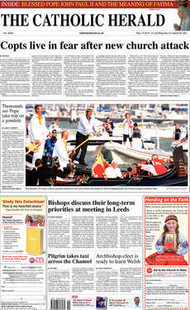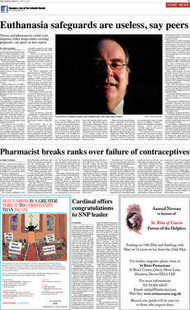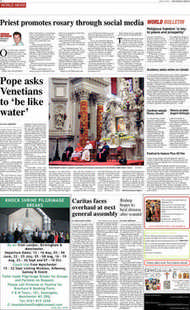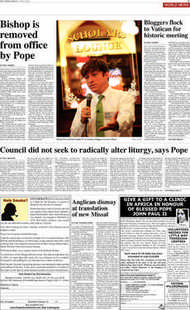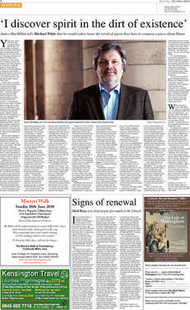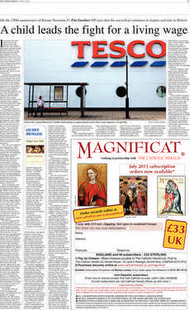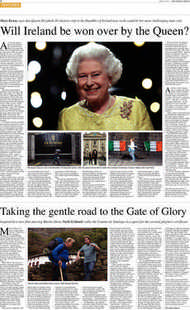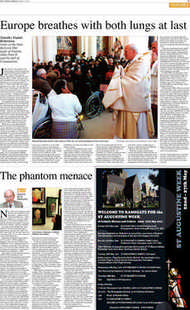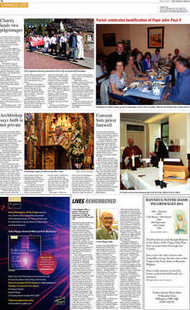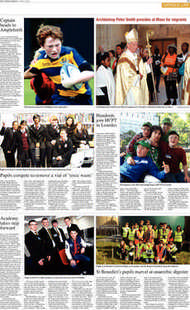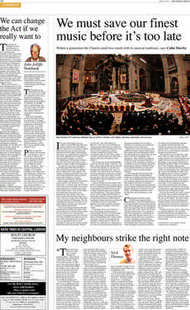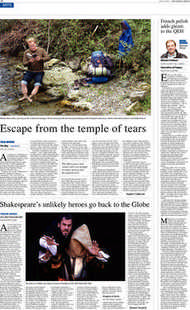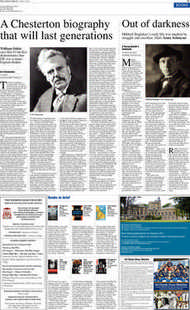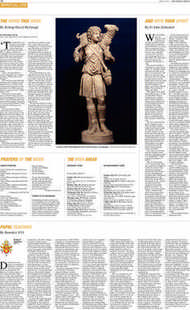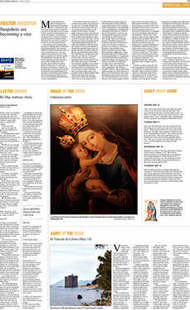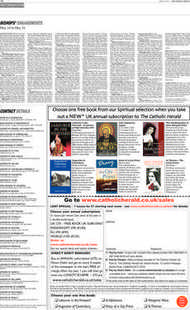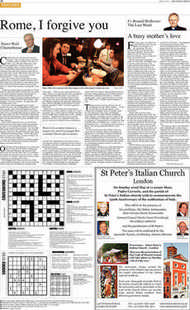Page 15, 13th May 2011
Page 15

Report an error
Noticed an error on this page?If you've noticed an error in this article please click here to report it.
Tags
Share
Related articles
The Everlasting Man Returns
Scholars To Meet In Oxford To Discuss Cause Of Chesterton
Chesterton Experts Meet For Chilterns Conference
News In Brief
Gkc Warmonger, Pacifist, Tory . .
A Chesterton biography that will last generations
William Oddie says that Fr Ian Ker demonstrates that GK was a major English thinker
G K Chesterton
BY IAN KER OXFORD UNIVERSITY PRESS, £35
This book completes a unique double. Newman and Chesterton are the two greatest apologists for the Catholic faith in the English language. Ian Ker’s magisterial new biography of Chestertonanother doorstopper at 750 pageswill now do for Chesterton what his definitive biography of Newman did for him: it will make any further biography unnecessary (and probably impossible) for a generation at least.
Like the Newman biography, it is the fruit of a good deal of primary research among manuscript and other hitherto little-used sources (he has done his time on the Chesterton papers in the British Library, so he belongs to the new generation of Chesterton scholars which has begun to emerge since these papers were catalogued and made freely available). Thus he has discovered entirely new biographical sources not mentioned in the first general biography, by Chesterton’s friend Maisie Ward.
All subsequent biographies have been substantially based on Maisie Ward and some on little else, though Michael Ffinch did have access to the Chesterton papers, then still uncatalogued, in Chesterton’s attic in Beaconsfield: material in Ffinch’s biography which doesn’t appear elsewhere can be assumed to be the result of a lucky dip in the then disorganised papers, though since he gives only rudimentary sources, one can’t always know. Fr Ker’s references are, of course impeccable (like his Newman, his Chesterton is handsomely published by the OUP).
He has also discovered sources not in the Chesterton papers, hitherto unknown or little used, including the journals and letters of his wife, Frances, and the letters and travel diaries of his secretary, Dorothy Collins: since these two women accompanied him on most of his international travels these sources have made possible for the first time detailed and often colourful descriptions of his extensive journeys, which included two extended tours of North America (including nearly two months at Notre Dame University—the archive of Notre Dame, used by Fr Ker for the first time, has been used particularly fruitfully) and journeys in Poland, France (several times), Italy, Spain, the Holy Land, Egypt, North Africa and elsewhere. Chesterton, of course, wrote about many of these journeys afterwards: but to have his accounts supplemented by the circumstantial day-byday detail of how this utterly helpless individual was successfully transported over such huge distances is fascinating and hugely entertaining. Fr Ker has also used to good effect the substantial holdings of letters from George Bernard Shaw in the Chesterton archive (interestingly, apparently unknown to Michael Holroyd, and certainly largely unused in his biography of GBS) together with other sources to construct a charming picture of the touching relationship of these two lifelong adversaries, who agreed on nothing but their affection for each other.
To write about Chesterton successfully requires competence in both theology and English literature: Dr Ker (he is not just a common or garden PhD but also a DLitt) has been a university teacher in both disciplines, and this double competence emerges very clearly in this remarkable book. Thus, he is able to assess hagiographies like St Francis ofAssisi and St Thomas Aquinas and apologetic works (notably Orthodoxy and The Everlasting Man) as convincingly as the literary criticism, which he considers – and so do I – to be among Chesterton’s very greatest writings (Charles Dickens, Robert Browning, The Victorian Age in Literature, William Blake, Chaucer etc) as well as Chesterton’s own novels and poetry. As in Fr Ker’s biography of Newman, he gives the possibility of getting a good general idea of a particular work before (or even without) reading it: all Chesterton’s major works and many minor works are extensively summarised, voluminously quoted from, and assessed.
Difficult areas are confronted with fairness and dispassion. The most difficult of these, perhaps, is the question of Chesterton’s alleged antiSemitism. Fr Ker convincingly puts this in historical context, and reminds us of Chesterton’s loathing for racial politics and of his youthful fury against Tsarist anti-Semitic persecutions: he might with advantage have cited Chesterton’s poems “Before a statue of Cromwell”, in which Cromwell’s re-admission of the Jews to England is praised (in contrast with Russian intolerance), and “To a certain Nation”, a poem from the same period attacking France over the Dreyfus affair. He reminds us, too, of Chesterton’s numerous attacks on Hitler for his persecution of the Jews. I have only one reservation. In his accounts of the various volumes of Chesterton’s collected journalism which appeared throughout his working life, Fr Ker treats the collections as though they were all completed, like his other “real” books, shortly before (ie, around six months before) their dates of publication. But some essays (as I found myself when working on his uncollected journalism) fit particularly into the context of a particular month or even week; not to write about them in that context is sometimes to lose part of their meaning. Fr Ker’s method of proceeding, it should be said, is quite normal: mine is a counsel of perfection (though near-perfection is what he has led us to expect). He makes a point of saying that his book “does not in any way aspire to be a chronicle of Chesterton’s career as a journalist”; but he was a journalist, and his journalistic identity was as important to him as his character as a distinguished “man of letters”. His brother Cecil wrote that “the atmosphere really native to him [was] the atmosphere of Fleet Street”. The immediacy of Chesterton’s response to his own age, so central to his character as a prophetic figure, derived in part from his journalistic compulsion to respond to it, and write about it, quickly, often just in time to meet a newspaper deadline: and his greatest writing retains his journalist’s instinct to communicate with his readers.
This book, nevertheless, has to be seen as a major literary achievement. Fr Ker’s major thesis, “that Chesterton should be seen as the obvious successor to Newman, and indeed as the successor to the other great Victorian ‘sages’... Carlyle, Ruskin, and Arnold...” is triumphantly vindicated. It ought to have been possible to say that it will now no longer be possible to dismiss Chesterton as an author of minor poetry and fiction and source of amusing anecdotes. However, in an astonishing attack on this book (and on Chesterton himself) A N Wilson – of course, who else – does just that in a Spectator review: Ian Ker’s book, he says, is an “attempt to make Chesterton seem like an important thinker” (my italics), and he implies that Chesterton’s achievement is best summed up in such writings as his Old King Cole parodies, the Father Brown stories and The Man Who Was Thursday. Wilson himself appears to have read (certainly, he refers to) nothing else: frankly, his opinions on Chesterton and on Fr Ker’s book are utterly worthless.
Nobody who has any interest in Chesterton can afford to be without Ian Ker’s book. But neither can anyone who wants to understand not only the age in which Chesterton himself lived, but also the age in which we live ourselves.
blog comments powered by Disqus


